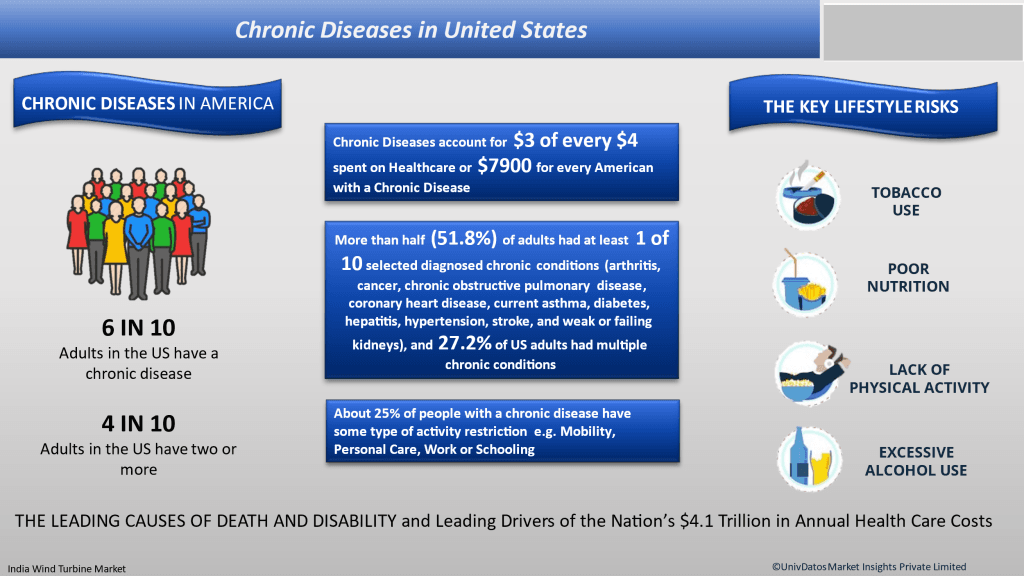Artificial Intelligence the Future of Drug Discovery in the United States
Introduction
United States’ rich network of research institutes, universities, and health care facilities are at the core of the region’s growth. In addition, the availability of varied and high-quality data sets allows for the creation and validation of AI algorithms for drug discovery use cases. The growing prevalence of chronic diseases and increasing investment in R&D activities are expected to complement the AI in drug discovery industry. Since the early days of artificial intelligence (AI), the United States has been at the forefront of the technology. IBM won a trivia game called ‘Jeopardy’ using its supercomputer ‘Watson’. This led the company to develop the idea of AI. Since then, AI has become an integral part of the technology industries and is often used on multiple fronts, such as in the pharmaceutical industry. Major U.S. tech companies have partnered with leading institutes to expedite drug discovery, design, and repurpose. They are also leveraging AI to study diseases and draw meaningful inferences that will improve disease management.
The increasing prevalence of chronic conditions increases the need for AI in drug discovery.
Chronic diseases are on the rise all over the world. According to the CDC, six out of 10 adults in the United States suffer from a chronic disease. The CDC also states that chronic diseases, including heart disease and diabetes, are the leading cause of death in the United States. This highlights the need to reduce the number of deaths caused by chronic diseases. The use of AI platforms for drug discovery can be a viable option for discovering drugs to treat and reduce the severity of different chronic diseases. Artificial Intelligence (AI) is expected to revolutionize drug discovery by accelerating the research and development (R&D) process, lowering the cost of drug development, and increasing the likelihood of drug approval. AI can also improve the efficacy of drug re-purposing research. For instance, In May 2022, Benevolent AI, a leading clinical-stage AI-enabled drug discovery company, announced that AstraZeneca has selected an additional novel target for Idiopathic Pulmonary Fibrosis (IPF) for its drug development portfolio, resulting in a milestone payment to Benevolent AI. This is the third novel target from the collaboration that has been identified using the Benevolent Platform across two disease areas, IPF and chronic kidney disease, and subsequently validated and selected for portfolio entry by AstraZeneca. This builds upon the recent extension of the collaboration with AstraZeneca to include two new disease areas, systemic lupus erythematosus, and heart failure, signed in January 2022. This has helped the company to make its collaboration stronger.

Recent Investment and Market Growth:
Factors such as key developments and the large number of players in the U.S. market also contribute to the growth of AI in drug discovery. For example:
- Google’s parent company Alphabet launched its first company in the field of drug discovery in November 2021.
- Microsoft signed a collaboration deal in September 2022. The deal provides Microsoft with AI, computational and cloud services for the drug discovery, drug discovery and development activities.
- Johnson & Johnson’s unit Janssen announced a collaboration in August 2022. Janssen will use SRI’s SynFini, AI platform to discover small molecules drugs.
These ongoing developments are expected to drive the market growth.
Conclusion In conclusion, the trajectory of artificial intelligence in revolutionizing the drug discovery landscape in the United States is undeniably upward. With the nation’s robust infrastructure in research and healthcare, coupled with significant investments in AI and R&D, the future of drug discovery seems poised for a transformative shift. The synergy between AI and pharmaceutical research has already demonstrated its potential in accelerating the discovery processes, enhancing drug efficacy, and repurposing existing drugs for new therapeutic uses. Notable collaborations between tech giants and pharmaceutical leaders underscore the industry’s confidence in AI’s role in addressing the challenges posed by chronic diseases and streamlining the path to novel treatments. As AI continues to evolve, its integration into drug discovery promises not only to expedite the development of life-saving medications but also to make the process more cost-effective and efficient. The journey ahead is promising, and the impact of AI in transforming drug discovery will undoubtedly be profound, reshaping how we approach healthcare challenges and ultimately improving patient outcomes on a global scale.
